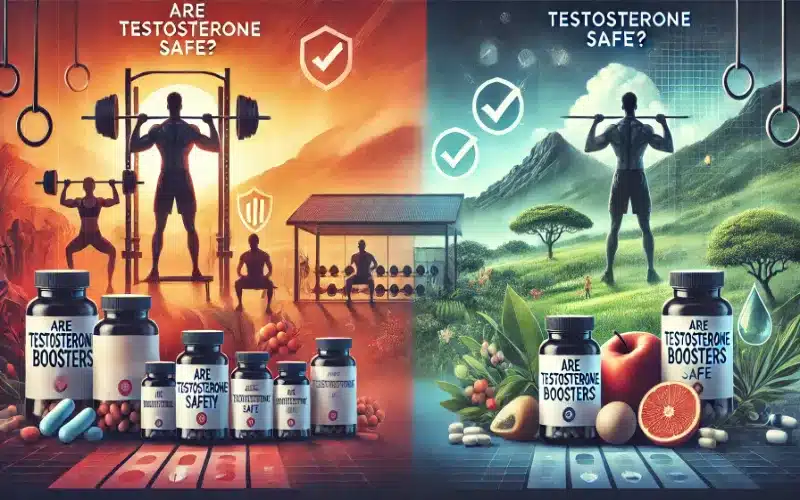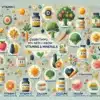Are Testosterone Boosters Safe? Comprehensive Safety Guide
In the realm of fitness and male health, testosterone boosters have surged in popularity. These supplements promise enhanced muscle mass, improved energy levels, and elevated libido. However, the burgeoning market raises pivotal questions:
Are testosterone boosters safe? Delving into this inquiry necessitates a comprehensive understanding of their composition, effects, and the regulatory frameworks governing their use.
How Testosterone Boosters Function
Testosterone boosters exert their effects through two primary pathways: stimulating the body’s endogenous testosterone production or supplying exogenous androgens. Understanding these mechanisms necessitates a deep dive into the endocrine system, particularly the hypothalamic-pituitary-gonadal (HPG) axis.
At the core of natural testosterone synthesis lies the HPG axis. Testosterone boosters often target this axis by enhancing the release of luteinizing hormone (LH) and follicle-stimulating hormone (FSH) from the pituitary gland. D-Aspartic Acid (DAA), a common ingredient, is pivotal in this process.
DAA acts on the hypothalamus, signaling the release of gonadotropin-releasing hormone (GnRH), which in turn stimulates the pituitary to secrete LH and FSH. Elevated levels of LH directly prompt the Leydig cells in the testes to ramp up testosterone synthesis.
Testosterone & Hormones
Some testosterone boosters introduce exogenous androgens, supplementing the body’s natural hormone levels. This approach can lead to an immediate increase in testosterone concentration but may disrupt the body’s hormonal equilibrium over time.
To mitigate potential imbalances, certain boosters incorporate aromatase inhibitors. Aromatase is the enzyme responsible for converting testosterone into estrogen. By inhibiting this enzyme, these supplements ensure that elevated testosterone levels are maintained without an unwanted surge in estrogen, which can counteract the desired anabolic effects.
Moreover, testosterone boosters may influence testosterone metabolism by affecting the 5-alpha-reductase enzyme, which converts testosterone into the more potent dihydrotestosterone (DHT). By modulating this pathway, boosters can enhance the bioavailability of testosterone, ensuring that a greater proportion remains active and available for physiological functions.
Common Ingredients in Testosterone Supplements
The efficacy of testosterone supplements is largely contingent upon their ingredient composition. A diverse array of compounds is employed, each meticulously selected for its role in hormonal modulation and testosterone enhancement.
- D-Aspartic Acid (DAA): An amino acid integral to the synthesis and release of GnRH, DAA catalyzes the subsequent release of LH and FSH, thereby amplifying testosterone production. Its role in signaling the HPG axis makes it a cornerstone ingredient in many boosters.
- Fenugreek Extract: Derived from the Trigonella foenum-graecum plant, fenugreek is lauded for its ability to enhance libido and improve insulin sensitivity. Compounds like furostanolic saponins in fenugreek are believed to inhibit enzymatic pathways that convert testosterone to estrogen, thus preserving testosterone levels.
- Zinc and Magnesium: These essential minerals are paramount for testosterone biosynthesis. Zinc acts as a cofactor for enzyme activities involved in hormone production, while magnesium influences muscle function and metabolic processes that indirectly support testosterone levels.
- Vitamin D: A fat-soluble vitamin, Vitamin D functions as a hormone precursor. Adequate levels of Vitamin D are correlated with optimal testosterone synthesis, and deficiencies have been linked to diminished testosterone levels. Its role in bone health and immune function further underscores its importance.

- Tribulus Terrestris: An herbal extract traditionally used in Ayurvedic medicine, Tribulus terrestris is reputed to boost libido and enhance athletic performance. The active compounds, saponins, are thought to stimulate the release of LH, thereby promoting testosterone production.
- Ashwagandha: Another adaptogenic herb, ashwagandha, is celebrated for its stress-reducing properties. By lowering cortisol levels, ashwagandha indirectly supports testosterone synthesis, as chronic stress is a known inhibitor of testosterone production.
- Boron: A trace mineral, boron has been shown to modulate steroid hormone levels, including testosterone. It may enhance the bioavailability of testosterone by influencing sex hormone-binding globulin (SHBG) levels.
- Ginger Extract: Known for its anti-inflammatory and antioxidant properties, ginger can support overall hormonal health. Some studies suggest that ginger supplementation can lead to modest increases in testosterone levels and improvements in sperm quality.
The synergistic interplay of these ingredients ensures that testosterone boosters can effectively enhance hormonal balance, promote anabolic processes, and support overall male health.
Are Testosterone Boosters Safe
When testosterone boosters are utilized responsibly and under the guidance of healthcare professionals, they can be a safe and effective means to enhance hormonal balance and overall well-being.
High-quality supplements, formulated with clinically researched ingredients and manufactured following Good Manufacturing Practices (GMP), minimize the risk of contamination and adverse effects.
Additionally, when taken at recommended dosages, testosterone boosters support natural testosterone production without overwhelming the body’s endocrine system.
Potential Benefits of Testosterone Boosters
Proponents of testosterone boosters advocate for a myriad of physiological and psychological benefits, underscoring their popularity in fitness and male wellness circles.
- Enhanced Muscle Hypertrophy: Testosterone is a potent anabolic hormone essential for muscle protein synthesis. Elevated testosterone levels facilitate the growth of muscle fibers, leading to increased muscle mass and strength. This is particularly beneficial for athletes and bodybuilders seeking to maximize their training outcomes.
- Increased Strength and Exercise Performance: Beyond muscle growth, testosterone contributes to neuromuscular function, enhancing muscle contraction and overall strength. Users often report improved endurance, power output, and recovery times, enabling more intensive and effective workouts.
- Elevated Mood and Reduced Fatigue: Testosterone has a significant impact on neurotransmitter function, influencing mood regulation and energy levels. Supplementation can lead to reduced feelings of fatigue, enhanced motivation, and a greater sense of well-being, which are crucial for maintaining consistent exercise regimens and daily activities.
- Heightened Cognitive Function: Emerging research suggests that testosterone plays a role in cognitive processes, including memory, attention, and spatial abilities. Enhanced testosterone levels may contribute to improved cognitive performance, aiding in both academic and professional settings.
- Bone Density Improvement: Testosterone is integral to bone mineralization. Increased levels can lead to enhanced bone density, reducing the risk of osteoporosis and fractures, especially in aging populations.
While these benefits are compelling, it is imperative to approach testosterone supplementation with a comprehensive understanding of both its advantages and potential risks.
Regulatory Oversight and Quality Control
The dietary supplement industry, including testosterone boosters, operates under a regulatory framework that is markedly less stringent than that governing pharmaceuticals. This disparity in regulatory oversight and quality control has profound implications for consumer safety and product efficacy.
- Regulatory Classification:Dietary Supplements vs. Pharmaceuticals
In numerous jurisdictions, testosterone boosters are classified as over-the-counter (OTC) dietary supplements rather than prescription medications. This classification exempts them from the rigorous testing and approval processes mandated for pharmaceuticals. Consequently, manufacturers are not required to provide comprehensive clinical trial data or proof of efficacy and safety prior to market entry. - FDA Oversight and Limitations
In the United States, the Food and Drug Administration (FDA) oversees the dietary supplement market but does so with limited authority. The Dietary Supplement Health and Education Act (DSHEA) of 1994 restricts the FDA’s ability to pre-approve supplements. Instead, the FDA can only take action against unsafe or misbranded supplements post-market, often after adverse events have been reported. This reactive approach leaves consumers vulnerable to potentially harmful products. - Variability in Product Quality and Potency
Due to the lack of stringent manufacturing standards, there is significant variability in the quality, potency, and purity of testosterone boosters. Good Manufacturing Practices (GMP) are not uniformly enforced, leading to inconsistencies in ingredient concentrations and product formulations. This variability can result in undesirable effects, ineffectiveness, or overconsumption of active ingredients.
Natural Alternatives to Testosterone Boosters
For individuals cautious about synthetic supplements, embracing natural alternatives can effectively support and enhance testosterone levels. Lifestyle modifications are foundational, with strength training—particularly resistance exercises like weightlifting—proven to stimulate testosterone production through muscle hypertrophy and neuromuscular activation.
- Ensuring adequate sleep, typically 7-9 hours per night, is crucial as sleep deprivation has been linked to reduced testosterone synthesis and impaired hormonal balance. Stress management techniques, such as meditation, yoga, and mindfulness practices, mitigate cortisol levels, a hormone that inversely affects testosterone production.
Nutritional strategies play a significant role in bolstering endogenous testosterone. Consuming a diet rich in healthy fats—including monounsaturated and saturated fats from sources like avocados, nuts, and olive oil—provides the necessary lipid substrates for steroid hormone biosynthesis.
- Adequate protein intake supports muscle repair and growth, while micronutrients such as zinc, magnesium, and vitamin D are indispensable for optimal testicular function and hormonal regulation. Incorporating intermittent fasting can enhance insulin sensitivity and growth hormone secretion, both of which are conducive to testosterone production.
Additionally, engaging in high-intensity interval training (HIIT) has been associated with acute increases in testosterone levels, owing to the metabolic stress and hormonal responses elicited by such intense exercise modalities.
By integrating these holistic approaches, individuals can naturally sustain and elevate their testosterone levels, fostering overall hormonal health and well-being without reliance on synthetic supplements.
Conclusion
The safety of testosterone boosters is a nuanced subject, contingent upon factors such as ingredient composition, dosage, and individual health status. While potential benefits are enticing, the attendant risks and the paucity of stringent regulatory oversight necessitate cautious consideration. Prospective users should engage in informed dialogues with healthcare providers, weighing the benefits against the risks, and exploring natural avenues to achieve hormonal equilibrium.










Add comment
You must be logged in to post a comment.